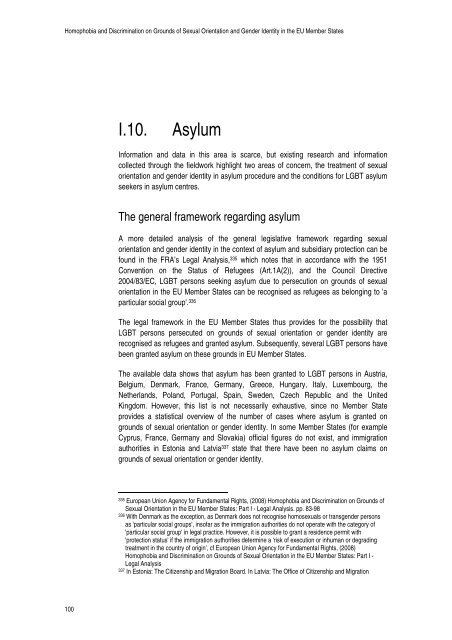Homophobia and Discrimination on
Homophobia and Discrimination on
Homophobia and Discrimination on
Create successful ePaper yourself
Turn your PDF publications into a flip-book with our unique Google optimized e-Paper software.
<str<strong>on</strong>g>Homophobia</str<strong>on</strong>g> <str<strong>on</strong>g>and</str<strong>on</strong>g> <str<strong>on</strong>g>Discriminati<strong>on</strong></str<strong>on</strong>g> <strong>on</strong> Grounds of Sexual Orientati<strong>on</strong> <str<strong>on</strong>g>and</str<strong>on</strong>g> Gender Identity in the EU Member States<br />
100<br />
I.10. Asylum<br />
Informati<strong>on</strong> <str<strong>on</strong>g>and</str<strong>on</strong>g> data in this area is scarce, but existing research <str<strong>on</strong>g>and</str<strong>on</strong>g> informati<strong>on</strong><br />
collected through the fieldwork highlight two areas of c<strong>on</strong>cern, the treatment of sexual<br />
orientati<strong>on</strong> <str<strong>on</strong>g>and</str<strong>on</strong>g> gender identity in asylum procedure <str<strong>on</strong>g>and</str<strong>on</strong>g> the c<strong>on</strong>diti<strong>on</strong>s for LGBT asylum<br />
seekers in asylum centres.<br />
The general framework regarding asylum<br />
A more detailed analysis of the general legislative framework regarding sexual<br />
orientati<strong>on</strong> <str<strong>on</strong>g>and</str<strong>on</strong>g> gender identity in the c<strong>on</strong>text of asylum <str<strong>on</strong>g>and</str<strong>on</strong>g> subsidiary protecti<strong>on</strong> can be<br />
found in the FRA’s Legal Analysis, 335 which notes that in accordance with the 1951<br />
C<strong>on</strong>venti<strong>on</strong> <strong>on</strong> the Status of Refugees (Art.1A(2)), <str<strong>on</strong>g>and</str<strong>on</strong>g> the Council Directive<br />
2004/83/EC, LGBT pers<strong>on</strong>s seeking asylum due to persecuti<strong>on</strong> <strong>on</strong> grounds of sexual<br />
orientati<strong>on</strong> in the EU Member States can be recognised as refugees as bel<strong>on</strong>ging to 'a<br />
particular social group'. 336<br />
The legal framework in the EU Member States thus provides for the possibility that<br />
LGBT pers<strong>on</strong>s persecuted <strong>on</strong> grounds of sexual orientati<strong>on</strong> or gender identity are<br />
recognised as refugees <str<strong>on</strong>g>and</str<strong>on</strong>g> granted asylum. Subsequently, several LGBT pers<strong>on</strong>s have<br />
been granted asylum <strong>on</strong> these grounds in EU Member States.<br />
The available data shows that asylum has been granted to LGBT pers<strong>on</strong>s in Austria,<br />
Belgium, Denmark, France, Germany, Greece, Hungary, Italy, Luxembourg, the<br />
Netherl<str<strong>on</strong>g>and</str<strong>on</strong>g>s, Pol<str<strong>on</strong>g>and</str<strong>on</strong>g>, Portugal, Spain, Sweden, Czech Republic <str<strong>on</strong>g>and</str<strong>on</strong>g> the United<br />
Kingdom. However, this list is not necessarily exhaustive, since no Member State<br />
provides a statistical overview of the number of cases where asylum is granted <strong>on</strong><br />
grounds of sexual orientati<strong>on</strong> or gender identity. In some Member States (for example<br />
Cyprus, France, Germany <str<strong>on</strong>g>and</str<strong>on</strong>g> Slovakia) official figures do not exist, <str<strong>on</strong>g>and</str<strong>on</strong>g> immigrati<strong>on</strong><br />
authorities in Est<strong>on</strong>ia <str<strong>on</strong>g>and</str<strong>on</strong>g> Latvia 337 state that there have been no asylum claims <strong>on</strong><br />
grounds of sexual orientati<strong>on</strong> or gender identity.<br />
335 European Uni<strong>on</strong> Agency for Fundamental Rights, (2008) <str<strong>on</strong>g>Homophobia</str<strong>on</strong>g> <str<strong>on</strong>g>and</str<strong>on</strong>g> <str<strong>on</strong>g>Discriminati<strong>on</strong></str<strong>on</strong>g> <strong>on</strong> Grounds of<br />
Sexual Orientati<strong>on</strong> in the EU Member States: Part I - Legal Analysis. pp. 83-98<br />
336 With Denmark as the excepti<strong>on</strong>, as Denmark does not recognise homosexuals or transgender pers<strong>on</strong>s<br />
as 'particular social groups', insofar as the immigrati<strong>on</strong> authorities do not operate with the category of<br />
'particular social group' in legal practice. However, it is possible to grant a residence permit with<br />
'protecti<strong>on</strong> status' if the immigrati<strong>on</strong> authorities determine a 'risk of executi<strong>on</strong> or inhuman or degrading<br />
treatment in the country of origin', cf European Uni<strong>on</strong> Agency for Fundamental Rights, (2008)<br />
<str<strong>on</strong>g>Homophobia</str<strong>on</strong>g> <str<strong>on</strong>g>and</str<strong>on</strong>g> <str<strong>on</strong>g>Discriminati<strong>on</strong></str<strong>on</strong>g> <strong>on</strong> Grounds of Sexual Orientati<strong>on</strong> in the EU Member States: Part I -<br />
Legal Analysis<br />
337 In Est<strong>on</strong>ia: The Citizenship <str<strong>on</strong>g>and</str<strong>on</strong>g> Migrati<strong>on</strong> Board. In Latvia: The Office of Citizenship <str<strong>on</strong>g>and</str<strong>on</strong>g> Migrati<strong>on</strong>

















